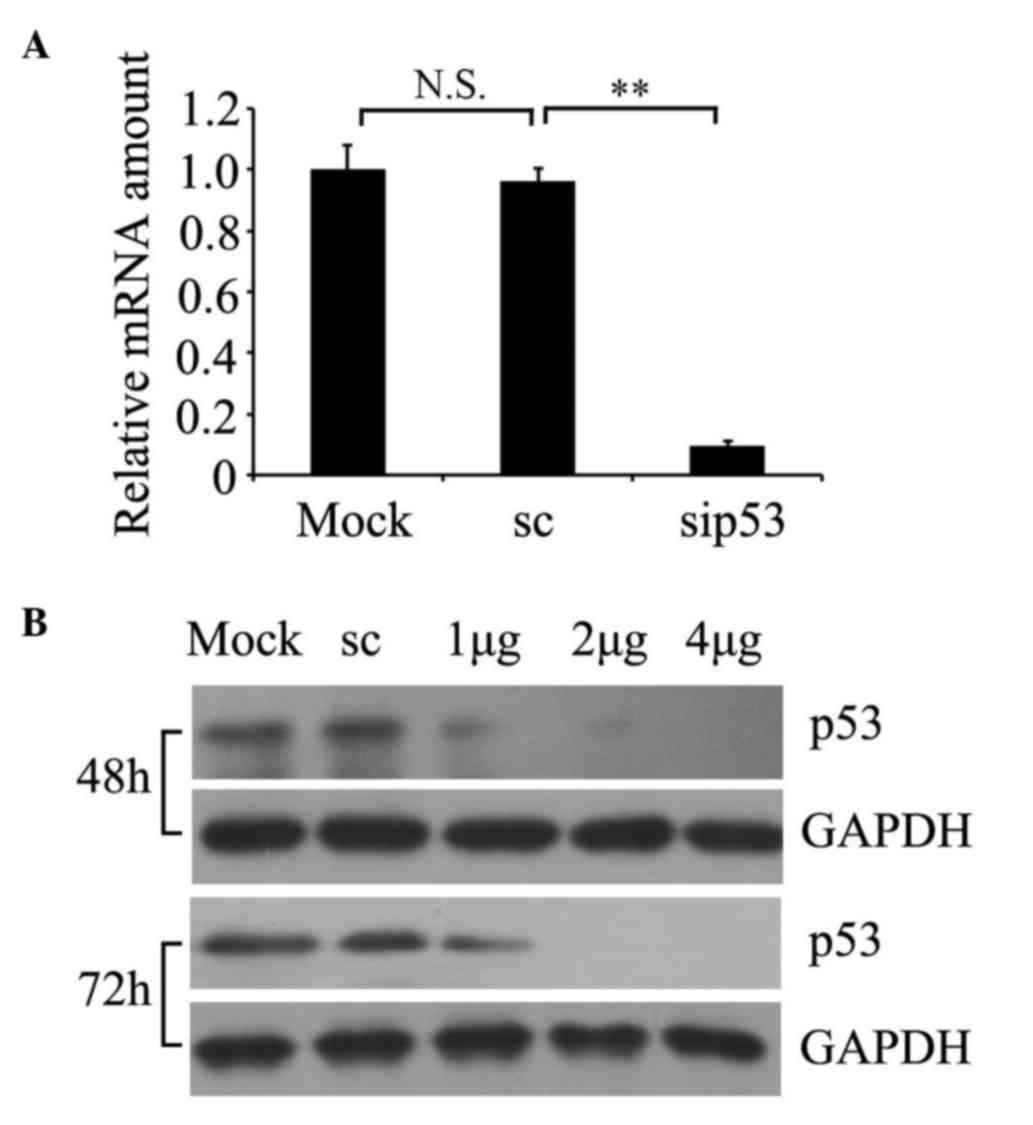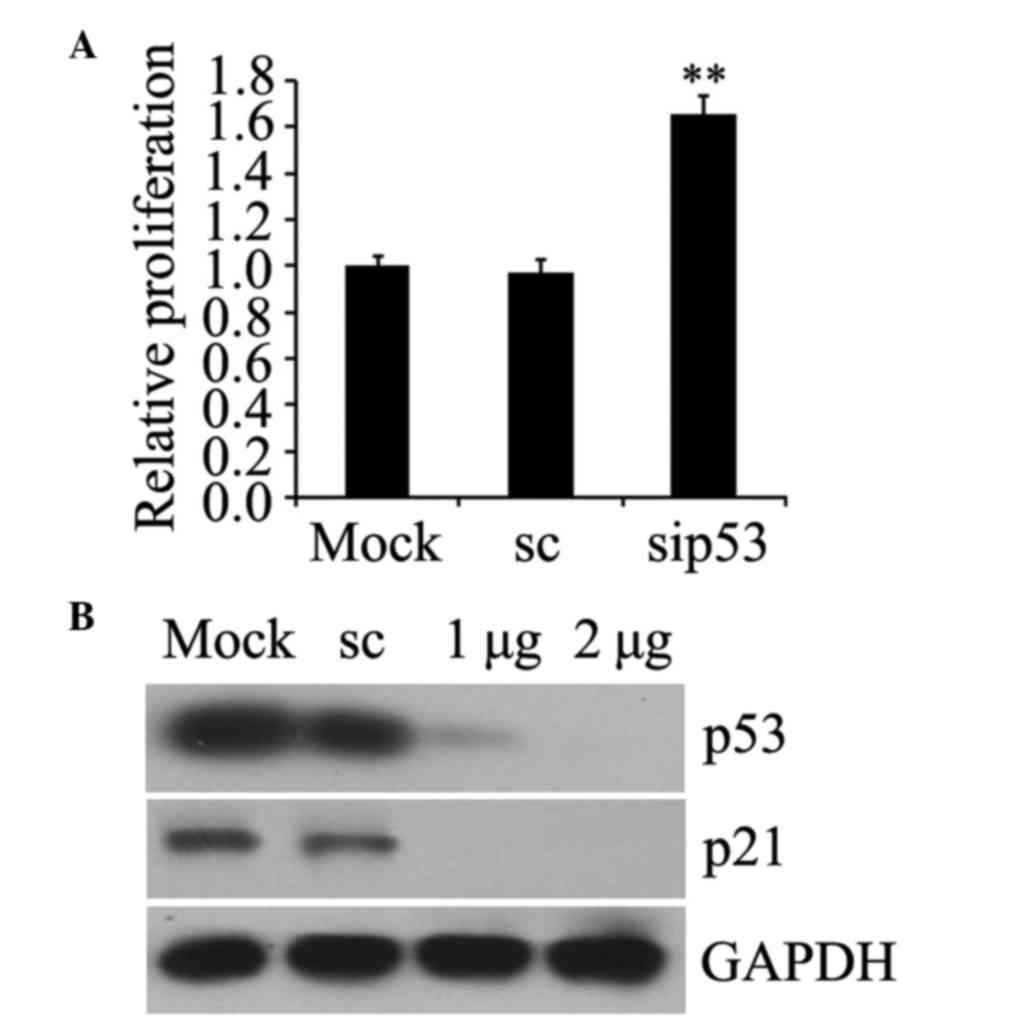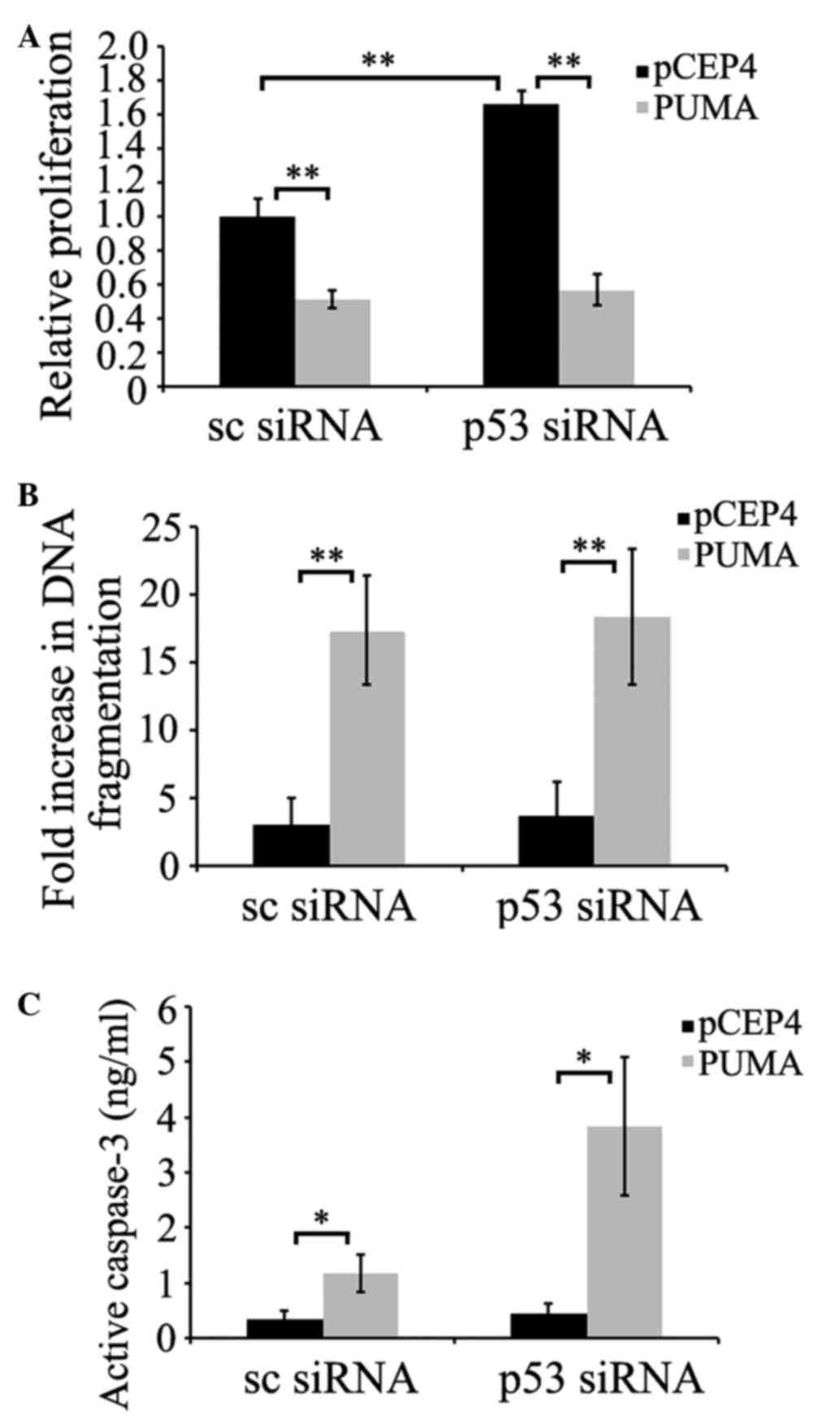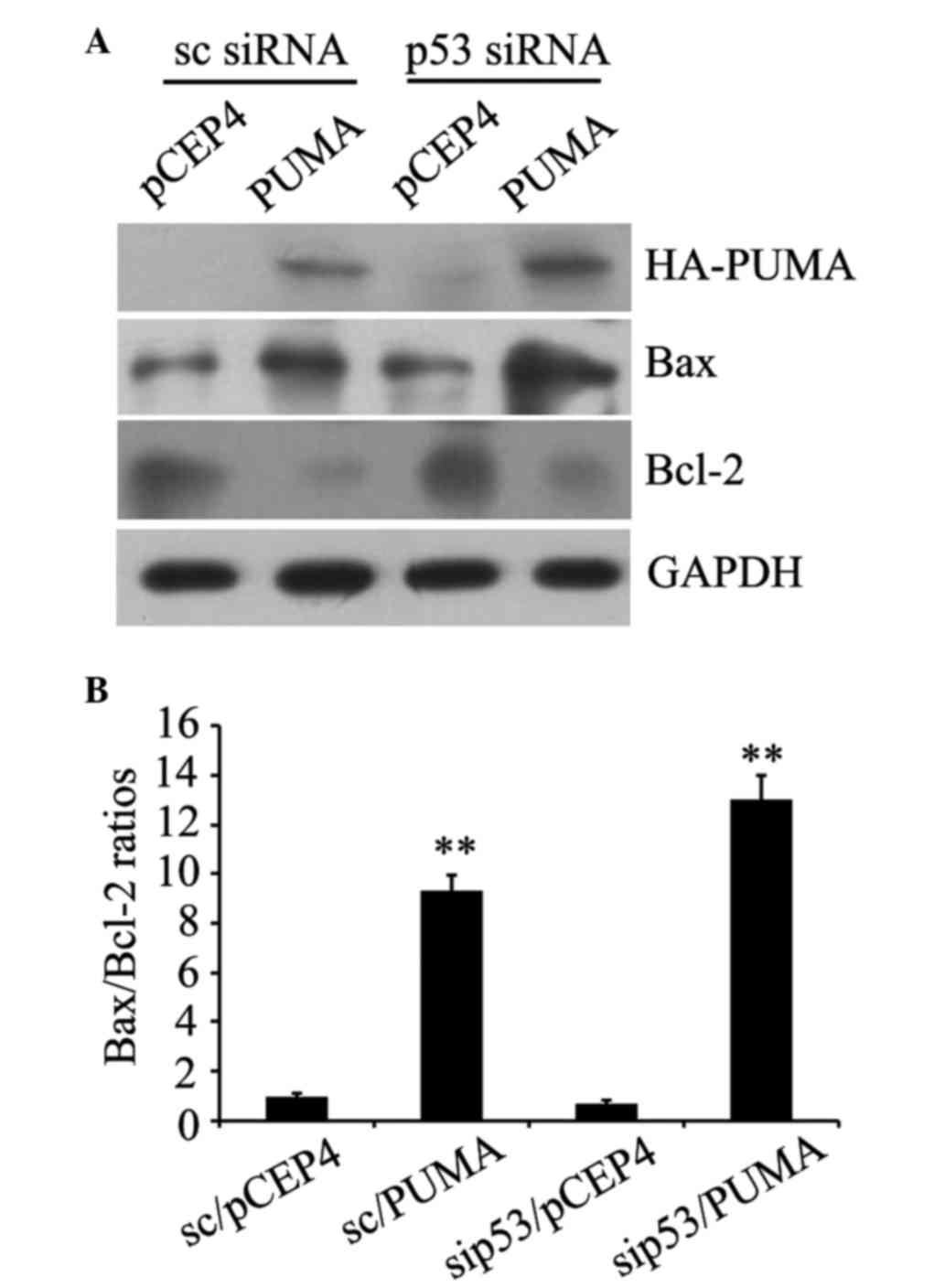|
1
|
Mandal A: Prostate Cancer, . NEWS MEDICAL.
The Latest Developments in Life Sciences & Medicine. http://www.news-medical.net/health/Prostate-Cancer.aspxAccessed.
February 27–2015.
|
|
2
|
Tsai SC, Lu CC, Lee CY, Lin YC, Chung JG,
Kuo SC, Amagaya S, Chen FN, Chen MY, Chan SF and Yang JS: AKT
serine/threonine protein kinase modulates bufalin-triggered
intrinsic pathway of apoptosis in CAL 27 human oral cancer cells.
Int J Oncol. 41:1683–1692. 2012.PubMed/NCBI
|
|
3
|
Umit UM, Berna T, Handan K, Ipek E, Berrak
Y, Can E and Bahadir GM: Role of melatonin and luzindole in rat
mammary cancer. J Invest Surg. 25:345–353. 2012. View Article : Google Scholar : PubMed/NCBI
|
|
4
|
Nakano K and Vousden KH: PUMA, a novel
proapoptotic gene, is induced by p53. Mol Cell. 7:683–694. 2001.
View Article : Google Scholar : PubMed/NCBI
|
|
5
|
Han J, Flemington C, Houghton AB, Gu Z,
Zambetti GP, Lutz RJ, Zhu L and Chittenden T: Expression of bbc3, a
pro-apoptotic BH3-only gene, is regulated by diverse cell death and
survival signals. Proc Natl Acad Sci USA. 98:11318–11323. 2001.
View Article : Google Scholar : PubMed/NCBI
|
|
6
|
Liu H, Li W, Yu X, Gao F, Duan Z, Ma X,
Tan S, Yuan Y, Liu L, Wang J, et al: EZH2-mediated Puma gene
repression regulates non-small cell lung cancer cell proliferation
and cisplatin-induced apoptosis. Oncotarget. Jul 26–2016.(Epub
ahead of print).
|
|
7
|
Jang Y, Kim J, Ko JW and Kwon YH:
Homocysteine induces PUMA-mediated mitochondrial apoptosis in
SH-SY5Y cells. Amino Acids. 48:2559–2569. 2016. View Article : Google Scholar : PubMed/NCBI
|
|
8
|
Ma J, Feng Y, Liu Y and Li X: PUMA and
survivin are involved in the apoptosis of HepG2 cells induced by
microcystin-LR via mitochondria-mediated pathway. Chemosphere.
157:241–249. 2016. View Article : Google Scholar : PubMed/NCBI
|
|
9
|
Sun Y, Xia P, Zhang H, Liu B and Shi Y:
P53 is required for Doxorubicin-induced apoptosis via the TGF-beta
signaling pathway in osteosarcoma-derived cells. Am J Cancer Res.
6:114–125. 2015.PubMed/NCBI
|
|
10
|
Wang P, Yu J and Zhang L: The nuclear
function of p53 is required for PUMA-mediated apoptosis induced by
DNA damage. Proc Natl Acad Sci USA. 104:4054–4059. 2007. View Article : Google Scholar : PubMed/NCBI
|
|
11
|
Jeffers JR, Parganas E, Lee Y, Yang C,
Wang J, Brennan J, MacLean KH, Han J, Chittenden T, Ihle JN, et al:
Puma is an essential mediator of p53-dependent and -independent
apoptotic pathways. Cancer Cell. 4:321–328. 2003. View Article : Google Scholar : PubMed/NCBI
|
|
12
|
Avila JL, Grundmann O, Burd R and Limesand
KH: Radiation-induced salivary gland dysfunction results from
p53-dependent apoptosis. Int J Radiat Oncol Biol Phys. 73:523–529.
2009. View Article : Google Scholar : PubMed/NCBI
|
|
13
|
Niizuma K, Endo H, Nito C, Myer DJ and
Chan PH: Potential role of PUMA in delayed death of hippocampal CA1
neurons after transient global cerebral ischemia. Stroke.
40:618–625. 2009. View Article : Google Scholar : PubMed/NCBI
|
|
14
|
Zhao Y, Coloff JL, Ferguson EC, Jacobs SR,
Cui K and Rathmell JC: Glucose metabolism attenuates p53 and
Puma-dependent cell death upon growth factor deprivation. J Biol
Che. 283:36344–36353. 2008. View Article : Google Scholar
|
|
15
|
Chipuk JE, Bouchier-Hayes L, Kuwana T,
Newmeyer DD and Green DR: PUMA couples the nuclear and cytoplasmic
proapoptotic function of p53. Science. 309:1732–1735. 2005.
View Article : Google Scholar : PubMed/NCBI
|
|
16
|
Gomez-Lazaro M, Galindo MF,
Fernandez-Gomez FJ, Prehn JH and Jordán J: Activation of p53 and
the pro-apoptotic p53 target gene PUMA during
depolarization-induced apoptosis of chromaffin cells. Exp. Neurol.
196:96–103. 2005.
|
|
17
|
Wong HK, Fricker M, Wyttenbach A,
Villunger A, Michalak EM, Strasser A and Tolkovsky AM: Mutually
exclusive subsets of BH3-only proteins are activated by the p53 and
c-Jun N-terminal kinase/c-Jun signaling pathways during cortical
neuron apoptosis induced by arsenite. Mol Cell Biol. 25:8732–8747.
2005. View Article : Google Scholar : PubMed/NCBI
|
|
18
|
Yu J, Wang P, Ming L, Wood MA and Zhang L:
SMAC/Diablo mediates the proapoptotic function of PUMA by
regulating PUMA-induced mitochondrial events. Oncogene.
26:4189–4198. 2007. View Article : Google Scholar : PubMed/NCBI
|
|
19
|
Giannakakou P, Nakano M, Nicolaou KC,
O'Brate A, Yu J, Blagosklonny MV, Greber UF and Fojo T: Enhanced
microtubule-dependent trafficking and p53 nuclear accumulation by
suppression of microtubule dynamics. Proc Natl Acad Sci USA.
99:10855–10860. 2002. View Article : Google Scholar : PubMed/NCBI
|
|
20
|
Kalousek I, Brodska B, Otevrelova P and
Röselova P: Actinomycin D upregulates proapoptotic protein Puma and
downregulates Bcl-2 mRNA in normal peripheral blood lymphocytes.
Anticancer Drugs. 18:763–772. 2007. View Article : Google Scholar : PubMed/NCBI
|
|
21
|
Fernandez PC, Frank SR, Wang L, Schroeder
M, Liu S, Greene J, Cocito A and Amati B: Genomic targets of the
human c-Myc protein. Genes Dev. 17:1115–1129. 2003. View Article : Google Scholar : PubMed/NCBI
|
|
22
|
Maclean KH, Keller UB, Rodriguez-Galindo
C, Nilsson JA and Cleveland JL: c-Myc augments gamma
irradiation-induced apoptosis by suppressing Bcl-XL. Mol Cell Biol.
23:7256–7270. 2003. View Article : Google Scholar : PubMed/NCBI
|
|
23
|
Yu J and Zhang L: PUMA, a potent killer
with or without p53. Oncogene. 27:(Suppl 1). S71–S83. 2008.
View Article : Google Scholar : PubMed/NCBI
|
|
24
|
Castedo M, Perfettini JL, Piacentini M and
Kroemer G: p53 - A pro-apoptotic signal transducer involved in
AIDS. Biochem Biophys Res Commun. 331:701–706. 2005. View Article : Google Scholar : PubMed/NCBI
|
|
25
|
Yee KS and Vousden KH: Contribution of
membrane localization to the apoptotic activity of PUMA. Apoptosis.
13:87–95. 2008. View Article : Google Scholar : PubMed/NCBI
|
|
26
|
Vogelstein B and Kinzler KW: Cancer genes
and the pathways they control. Nat Med. 10:789–799. 2004.
View Article : Google Scholar : PubMed/NCBI
|
|
27
|
Yu J and Zhang L: The transcriptional
targets of p53 in apoptosis control. Biochem Biophys Res Commun.
331:851–858. 2005. View Article : Google Scholar : PubMed/NCBI
|
|
28
|
Hao and Cho WC: Battle against cancer: An
everlasting saga of p53. Int J Mol Sci. 15:22109–22127. 2014.
View Article : Google Scholar : PubMed/NCBI
|
|
29
|
Livak and Schmittgen, . Analysis of
relative gene expression data using real-time quantitative PCR and
the 2-ΔΔCt method. Methods. 25:402–408. 2001. View Article : Google Scholar : PubMed/NCBI
|
|
30
|
Pap T, Aupperle KR, Gay S, Firestein GS
and Gay RE: Invasiveness of synovial fibroblasts is regulated by
p53 in the SCID mouse in vivo model of cartilage invasion.
Arthritis Rheum. 44:676–681. 2001. View Article : Google Scholar : PubMed/NCBI
|
|
31
|
Pommier Y, Sordet O, Antony S, Hayward RL
and Kohn KW: Apoptosis defects and chemotherapy resistance:
Molecular interaction maps and networks. Oncogene. 23:2934–2949.
2004. View Article : Google Scholar : PubMed/NCBI
|
|
32
|
Hirscheler B: Europe gives green light to
first gene therapy for children. http://www.arabtimesonline.com/wp-content/uploads/pdf/2016/apr/03/29.pdfAccessed.
April 13–2016.
|
|
33
|
Coghlan A: Gene Therapy Approved. New
Scientist. 230:8–9. 2016. View Article : Google Scholar
|
|
34
|
Cyranoski D: Chinese scientists to pioneer
first human CRISPR trial. Nature. 535:476–477. 2016. View Article : Google Scholar : PubMed/NCBI
|
|
35
|
Yamanishi Y, Boyle DL, Rosengren S, Green
DR, Zvaifler NJ and Firestein GS: Regional analysis of p53
mutations in rheumatoid arthritis synovium. Proc Natl Acad Sci USA.
99:10025–10030. 2002. View Article : Google Scholar : PubMed/NCBI
|
|
36
|
Firestein GS, Echeverri F, Yeo M, Zvaifler
NJ and Green DR: Somatic mutations in the p53 tumor suppressor gene
in rheumatoid arthritis synovium. Proc Natl Acad Sci USA.
94:10895–10900. 1997. View Article : Google Scholar : PubMed/NCBI
|
|
37
|
Rème T, Travaglio A, Gueydon E, Adla L,
Jorgensen C and Sany J: Mutations of the p53 tumour suppressor gene
in erosive rheumatoid synovial tissue. Clin Exp Immunol.
111:353–358. 1998. View Article : Google Scholar : PubMed/NCBI
|
|
38
|
Kullmann F, Judex M, Neudecker I, Lechner
S, Jüsten HP, Green DR, Wessinghage D, Firestein GS, Gay S,
Schölmerich J and Müller-Ladner U: Analysis of the p53 tumor
suppressor gene in rheumatoid arthritis synovial fibroblasts.
Arthritis Rheum. 42:1594–1600. 1999. View Article : Google Scholar : PubMed/NCBI
|
|
39
|
Yao Q, Wang S, Glorioso JC, Evans CH,
Robbins PD, Ghivizzani SC and Oligino TJ: Gene transfer of p53 to
arthritic joints stimulates synovial apoptosis and inhibits
inflammation. Mol Ther. 3:901–910. 2001. View Article : Google Scholar : PubMed/NCBI
|
|
40
|
Cha HS, Rosengren S, Boyle DL and
Firestein GS: PUMA regulation and proapoptotic effects in
fibroblast-like synoviocytes. Arthritis Rheum. 54:587–592. 2006.
View Article : Google Scholar : PubMed/NCBI
|
|
41
|
Thin TH, Li L, Chung TK, Sun H and Taneja
R: Stra13 is induced by genotoxic stress and regulates
ionizing-radiation-induced apoptosis. EMBO Rep. 8:401–407. 2007.
View Article : Google Scholar : PubMed/NCBI
|
|
42
|
Dudgeon C, Peng R, Wang P, Sebastiani A,
Yu J and Zhang L: Inhibiting oncogenic signaling by sorafenib
activates PUMA via GSK3β and NF-κB to suppress tumor cell growth.
Oncogene. 31:4848–4858. 2012. View Article : Google Scholar : PubMed/NCBI
|
|
43
|
Yu J, Yue W, Wu B and Zhang L: PUMA
sensitizes lung cancer cells to chemotherapeutic agents and
irradiation. Clin Cancer Res. 12:2928–2936. 2006. View Article : Google Scholar : PubMed/NCBI
|
|
44
|
Gupta S, Afaqa F and Mukhtar H:
Involvement of nuclear factor-kappa B, Bax and Bcl-2 in induction
of cell cycle arrest and apoptosis by apigenin in human prostate
carcinoma cells. Oncogene. 21:3727–3738. 2002. View Article : Google Scholar : PubMed/NCBI
|
|
45
|
Xiao D, Vogel V and Singh SV: Benzyl
isothiocyanate-induced apoptosis in human breast cancer cells is
initiated by reactive oxygen species and regulated by Bax and Bak.
Mol Cancer Ther. 5:2931–2945. 2006. View Article : Google Scholar : PubMed/NCBI
|
|
46
|
Xiao D, Lew KL, Kim YA, Zeng Y, Hahm ER,
Dhir R and Singh SV: Diallyl trisulfide suppresses growth of PC-3
human prostate cancer xenograft in vivo in association with Bax and
Bak induction. Clin Cancer Res. 12:6836–6843. 2006. View Article : Google Scholar : PubMed/NCBI
|


















